This is my third entry in an ongoing Beyond the Bluegrass series where I take a look at a band outside the central KY area that deserves some greater recognition. The Volcanic Eruptions were as much a part of the 60s scene around the Ashland area as those far more recognizable names as say the Outcasts or Kickin’ Mustangs. While their EP may be lesser-known than other 45s from that area, it is nevertheless very rewarding for the lucky few who have it in their collections. Let’s drift back once more…. [2022 Shawn Chambers / Lexingtunes]
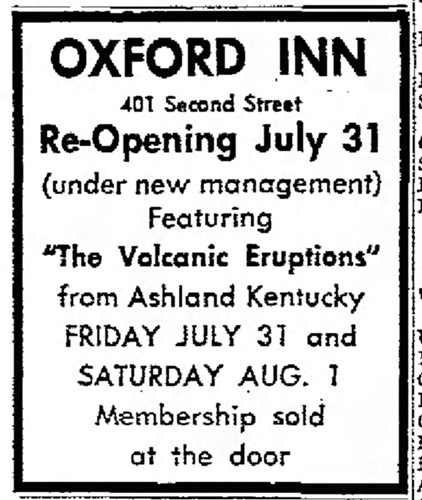 The origins of the Eruptions started in late 1966 with a group of Paul Blazer High School students sitting around Tom Carver’s house one day. Beyond soon-to-be-vocalist Carver, this early brainstorming session included drummer Everett Hitchcock and Jim Steele and a few others. While it led to a name it led to little else as Steele’s parent immediately nixed his participation and no serious practices were undertaken; however, the idea persisted.
The origins of the Eruptions started in late 1966 with a group of Paul Blazer High School students sitting around Tom Carver’s house one day. Beyond soon-to-be-vocalist Carver, this early brainstorming session included drummer Everett Hitchcock and Jim Steele and a few others. While it led to a name it led to little else as Steele’s parent immediately nixed his participation and no serious practices were undertaken; however, the idea persisted.
Hitchcock approached his lifelong pal Duane Gregory Neese with an offer to join the band on keys. Never mind that Greg had most currently been playing trumpet prior to graduating earlier in the year and had not really been playing piano since his childhood lessons – he had the boldness of youth and eagerly agreed to join. With a loan from his grandfather for a Farfisa, the band was half complete.
A couple more classmates in saxophonist Buddy Castle and bassist John Williamson were added in short order. Prior to assuming lead guitar, the role of rhythm guitarist fell to yet another classmate in Jim Thomas who had been coached by both his father and tutor Dick Meyers on his Epiphone Casino. As for the lead guitar…it was a most unusual, but short-lived arrangement.
Dee Hall was brought to the attention of the band by her husband Brownie, who by all accounts was a bit of a hustler and of a domineering disposition. Slender with a stylish pixie haircut, Dee was a stark contrast to Brownie and her personality alone would have been enough to win the band over, but her skills were of another level. Self-taught and at least ten years older, Dee shredded on her Fender Mustang.
The earliest shows were another sign of the boldness of youth. The boys would show up to Armco Park or a local strip mall with an electrical outlet and just plug in and play. Inevitably a crowd would assemble to enjoy the free entertainment. The addition of Dee and their increasing skills due to practice sessions in the Neese family garage led to better venues, but the tensions with Brownie continued.
Prior to the later addition of trumpets and a much more soul oriented sound, these early performances were typical of post-British Invasion with guitar/keys driven songs – think Rolling Stones, Paul Revere, ? and the Mysterians, but there was also the occasional foray into Motown. Dee’s solos should have been a showcase, but invariably Brownie would instruct her to turn her back to the audience so no one could see her chord progressions. This paranoia and the insistence on keeping Dee in a bubble led to the band promoting Jim Thomas to lead and parting ways with Brownie with Dee being collateral damage. Carver and Thomas resumed handling the basic business affairs, but more changes were on the horizon.
Competition for venues was tough with so much Ashland talent not to mention the numerous big bands drifting over from Huntington, West Virginia. The regional bands included The Explosive Dynamiks, The Parliaments, The Outcasts, The Kickin’ Mustangs, The Satisfied Minds, The Fugitives…and the list goes on. The rivalries were still friendly and sometimes even included family such as Jim Thomas’ cousin Al Collinsworth who played with the Outcasts. Shows at youth clubs, Black’s Roller Rink, school dances, sock hops, and the Ashland Armory brought exposure and the band to the attention of Hal Scott.
Businessman Scott was THE face of band management in Ashland. His stable of talent seemed to operate as a farm club for Plato Records out of Milton, West Virginia, with nearly his entire Hal Scott Enterprises roster eventually recording there. The Eruptions agreed to his terms of “Exclusive Management” and as he was so prone to do, Scott immediately added “Volcanic” to the band name much as he had done with the Kickin’ Mustangs who were a far less feisty “Mustangs” prior to Scott. This showed a certain savviness on the part of Scott who could then lay claim to the name if a band later decided to bolt for greener pastures. Despite his questionable math that never seemed to sum to his promise of taking only a 10% fee, Scott did deliver on taking the band to the next level.
His contacts opened up the world of fraternity and sorority dances and better paying gigs around the Tri-State area. With the majority of the boys having graduated in ’67, the band’s freedom to travel was also greatly increased and Scott took full advantage. His scheduling could be demanding with a Friday show maybe way down Route 23 in rural Eastern Kentucky followed by a gig the next night far into West Virginia territory. Fortunately, the old days of dropping the tongue hitch of a box trailer onto a station wagon was behind them and the boys would eventually secure a touring van with a side logo painted on by the multi-talented bassist Williamson.
It wasn’t just financial changes happening fast, but cultural and personnel changes that would send the band in an entirely new musical direction. Greg Neese the oldest member had accepted a job at Armco Steel and between work and enrolling in college courses ran out of candle ends to burn and stepped away. Vocalist Tom Carver had been plagued by voice issues (probably not helped by his heavy smoking habit) and when pre-show salt gargles failed to bring the necessary remedy he bowed out, too. John Williamson was on the verge of marriage and also needed full-time employment and ended his days with the band.
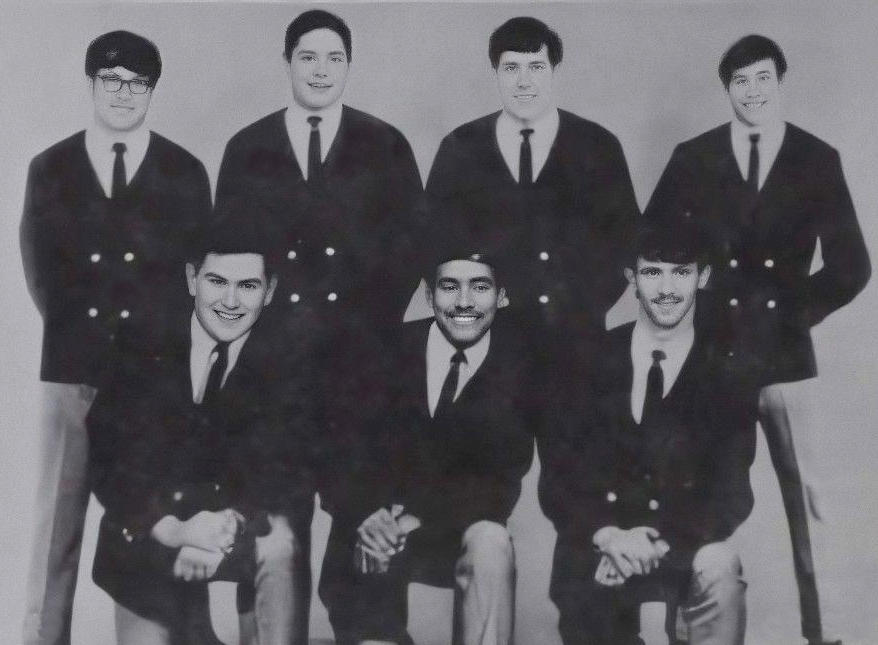
With subtractions come additions and joining original members Everett Hitchcock, Buddy Castle, and Jim Thomas were a trio of South Point, Ohio, musicians with vocalist Butch Howard arriving first, followed by Dave Brown on his big Hammond C3, and young bassist Mike Pleasant. Additionally, Frank Slavens was added on trumpet. With Howard’s soulful vocal and Slavens’ horn, the focus shifted more squarely to soul and the type of horn-infused rock coming into vogue by bands like Blood, Sweat & Tears.
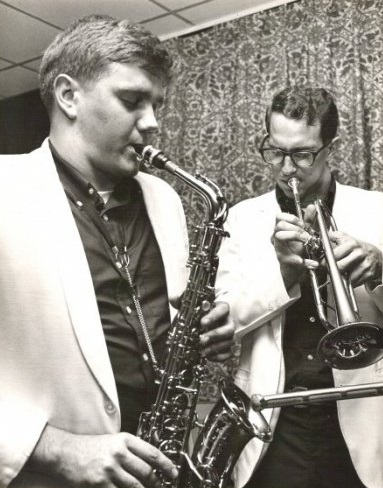
This style shift was even more apparent once Slavens left and was replaced by West Virginia native Ed Nida, a trumpeter and music education major at Marshall University in Huntington. Nida was joined soon after in 1969 by fellow trumpeter at Marshall (and yet another South Point, Ohio, native) in Brian Cordle – who just happened to have spent two years playing for the legendary area band The Parliaments.
In 1969, this now solidified octet traveled to nearby Greenup, Kentucky, to record tracks for their vinyl debut. The band director at Greenup County High School was Ronald K. Ball who was one of many franchise associates of Century Records a custom pressing outfit that catered primarily to the education market. Under his supervision in the band room, the Volcanic Eruptions laid down four covers for an EP.
Arguably the highlight is their very up-tempo rendition of Eddie Floyd’s Stax classic “Knock on Wood” nodding clearly to the Otis & Carla version. The other cuts include a cover of the then-recent Sam & Dave “Soul Sister, Brown Sugar” as well as the trumpet classic “Grazing In the Grass” and the needs-no-introduction “Respect.” Don’t be fooled into thinking this was just another EP of bar band style covers. Far from it! Butch’s vocals have a great “live” feel with his own improvisations, Pleasant delivers outstanding bass lines, the dual trumpets are tight and all the boys clearly brought it to the session. Party record!
(Find the other cuts at the Lexingtunes YouTube page HERE)
Hal Scott controlled the bulk of the copies once pressed and certainly seems to have taken a different approach than most band managers. The traditional route is getting the records to local radio dee-jays, music shops and possibly trade publications. Instead, Scott seems to have used many as demos to potential venues where he hoped to get the band booked and it remains a challenging find.
There were still many excellent shows in the coming year – including perhaps their biggest gig opening for and backing the Drifters at Ohio’s Rio Grande College. This was an unexpected chance with no time to prepare. The Eruptions had barely arrived when the Drifters’ guitarist presented them with faintly penciled in lead sheets of the playlist. Cordle recalls:
These papers were really old and the pencil really faint. To make it worst when the show started they put this big spotlight on the Drifters and turned out the lights on us! (laughs) Someone found some candles backstage and we huddled around Dave and melted some wax onto his Hammond cabinet and stuck the candles there and did our best to see what to play…
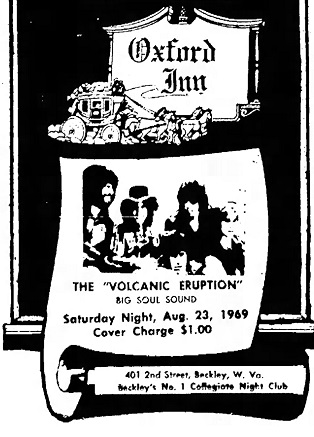 Other solid shows found the Eruptions appearing multiple times at the hot Oxford Inn in Beckley, West Virginia, and the largest dance of the year at Glenville State College. Ohio beckoned with the Jolly Roger in Ironton and other shows at Rio Grande College.
Other solid shows found the Eruptions appearing multiple times at the hot Oxford Inn in Beckley, West Virginia, and the largest dance of the year at Glenville State College. Ohio beckoned with the Jolly Roger in Ironton and other shows at Rio Grande College.
The band was in demand, but life was just as demanding. The beginning of the end started in 1970. Ed Nida dropped out to enter the military and was followed soon after by Brian Cordle. Jim Thomas was tired of travel and looking to settle down and was gone in that year as well. The band persisted into early 1971 it seems, but scaling down and trying to find suitable replacements just didn’t happen and the final chapter of the Eruptions was written.
Discography:
EP:
Century Custom Soul Sister, Brown Sugar; Knock On Wood / Grazing In the Grass; Respect 1969
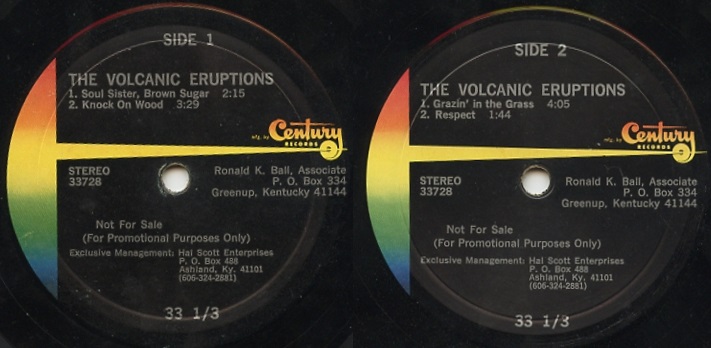
Thank you very much for sharing this article. My father is the late Frank Slavens and I never new he was a part of this band until after he passed and I found memorabilia from his time in the Volcanic Eruptions.
The guys told me what a great player Frank was and his contribution to the band was certainly not forgotten by the rest of the boys. Best to your family and sorry to hear of Frank’s passing.
Mike Lovin (Mustangs) replaced Jim Thomas and when Mike left, Hal Scott recommended me to Everett Hitchcock. My band The Prara’s had just broken up. I was guitarist with the Eruptions from 69 till summer of ‘70. Great guys and great memories. David Booth
Hey David, thanks for the later history. If you have any pics of you with the Eruptions I’m sure the world would love to see ’em! Best, Shawn
I remember all of these bands. We often had some of them at Coles Jr High in the late 60s and I talked to Hal Scott on numerous occasions. He would always send me new glossy photos to promote the bands – good times!